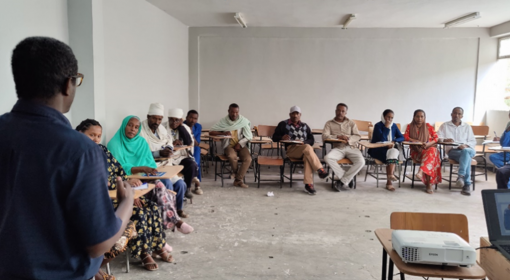by Jan Teun Visscher, Taha al-Washali, Osama Al-Jalaini, Belal Al-Shuja’a and Frank van Steenbergen
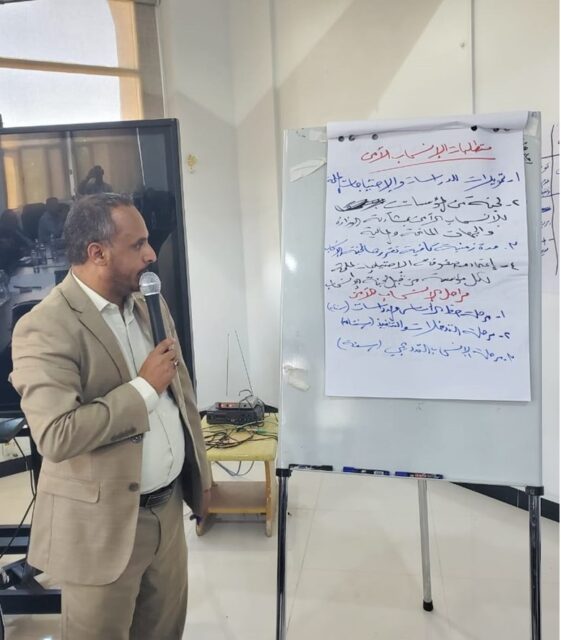
It is not unusual for trainings consisting of experts presenting interesting topics to a mixed group of people, sharing the latest approach and insights. Quite often this is where it stays: even if highly relevant, the individual trainee may not be able to bring the classroom insights into the workflow of his/her organization. Particularly, in emergencies or challenging development contexts, such as Yemen, such training may not strike a chord with the work challenges of the trainees. Yet training can be done differently – and capacity building can be problem-based right from the beginning.
This note presents an overview of the results and impact of a problem-based capacity building program for local institutions that was developed in Yemen in 2022 and implemented effectively in 2023 and 2024.
The capacity building program was developed to assist the beneficiary organisations to enhance the management of externally funded projects and lift performance of public services in Yemen. The program was administered by UNOPS and was undertaken by a consortium of three key partners, MetaMeta, Sana’a University (WEC) and Aden University (CESS). It brought together capacity building efforts from three separate World Bank programs now jointly addressing Yemeni service providers in water and sanitation, solid waste management and road development and maintenance.
The program was extra challenging in terms of organization with trainees from both the South and the North of Yemen, because of the overall security situation and the necessity of time-taking government clearances and due to challenging banking procedures. The program adopted problem-based learning, which was new in Yemen, also in many other places. As such the program combined capacity building of participants with the objective that the new learning contributed directly to improvements in their organizations (Box 1). This entails a shift of emphasis from training individual skills of participants only to exploring important problems in their organizations and to help trainees to help solve these problems. Participants needed to get used to this approach that challenged them and their management to identify key problems that could be addressed as a part of the learning. The organizations that send the trainees were explicitly asked to send staff that were pivotal in addressing those problems. The problem-based learning approach was also an important challenge for the trainers as they were forced gradually to focus on concrete problems trainees were facing in their work rather than on standard training knowledge.
| Box 1. The nature of problem based capacity building Problem based capacity was adopted to:
|
This note is a stock taking of experiences and achievements. The bottom-line conclusion is that the program managed to overcome a considerable number of administrative and strategic challenges and was able to reach an impressive output, in spite of the enduring conflict in the country. An effective capacity building delivery system (technical, managerial, financial) has been set in place achieving a high number of trainees with an innovative approach to learning. It is crucial to find ways to further address the enormous capacity building needs in Yemen triggered by severe brain drain from the government sector and keep making use of the effective system set in place.
Achievements
Whereas the last trainings of the current batches are ongoing, the main achievements of the training program include:
- The development of 48 thematic training courses most of which adopted problem-based learning
- Training a total of 2984 participants (1548 in the North and 1436 in the South) in a total of 149 courses (77 in the North and 72 in the South) from 70 organisations.
- Building the capacity of over 30 trainers by assisting and coaching them to adopt new methods of learning and teaming them up with practitioners from implementing organizations who also benefitted from their involvement.
- Improving capacity to deliver training at the Yemeni consortium partner institutions, Sana’a University (WEC) and Aden university (CESS), by improving their infrastructure and organization and increasing the skills of their trainers and connecting them with practitioners.
The main important problems identified by participants
The interesting part of the problem-based learning approach is that it generates a very good overview of the main problems that were identified by the organizations. This is valuable information that can be used to identify priorities for external support. A summary of the main problems that were identified are listed in boxes 2 (water supply and sanitation), 3 (roads) and 4 (solid waste management).
Box 2. Overview of priority problems identified in the water sector
|
Box 3. Overview of priority problems identified in the road sector.
|
Box 4. Overview of priority problems identified in the solid waste management sector
|
3. What was taken up
A follow up survey was undertaken among participants several months after the completion of the trainings. A summary of the results of this survey is presented here.
- Six hundred sixty-five – 665 trainees provided feedback through a survey some months after their training, 43.5% from the South and 56.5% from the North. They provided very positive feedback (Box 5), among others referring to developing plans and solving problems for their organizations.
- Trainees ranked the trainings, the trainers, and the materials between very good and excellent. In general trainings that were repeated received a higher ranking suggesting that trainers ‘got better at the approach’
- Of the trainees 89.8% developed a specific small plan to try and solve specific problems, 85.5% of them have discussed these with their management and 70% have solved some of the problems.
- Trainers provided feedback with respectively 56.3% and 40.6% indicating that they considered the problem-based trainings very useful or useful for participants. All of them mentioned that they will include the problem-based approach in future courses. They also recognised the benefit of the positive link with practitioners in the field.
- WEC from Sana’a University and CESS from Aden University benefitted in terms of improving their training facilities and training administration, strengthened the training skills of their staff, gained understanding of the need to involve practitioners and are integrating training materials in the courses for their regular trainees. They have now a data base of good trainers nation-wide for 48 themes including HR management, financial auditing, organisational development, MEAL, report writing, proposal development as well as the technical themes such as solar power, non-revenue water, soil stabilisation, cost-recovery, etc.
| Box 5: Some responses from post training survey | |||
 |  |  |  |
| 77.4% indicated that the benefit they gained from the training was excellent (blue) or very good (red); 17.1% (orange) answered good | 94.1% identified with their team specific problems that need to be solved in their organization | 89.8% developed a specific plan to try and solve specific problems, 85.5% of them have discussed these with their management and 70% have solved some of the problems | 95.6% indicated that they would recommend this training to others |
| Results of survey some months after the training; 665 participants (56.5% from North and 43.5% from South) | |||
4. Examples of organizational improvements
It was very encouraging to obtain feedback from trainees that state they were able to generate interventions that supported the improvement of the performance of their organization. This clearly shows the benefit from the problem-based learning approach. Some examples that were provided are presented here:
- Establishment of complaint management units in several water utilities are being initiated as a result of a training on complaint management (Figure 1)
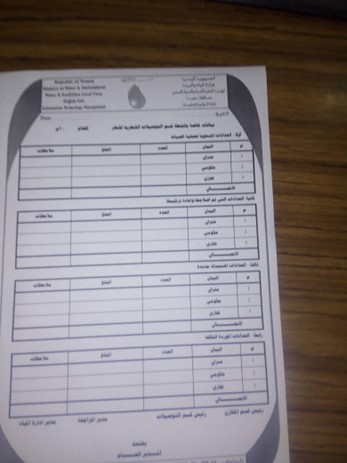
- The training of the Cleaning Funds has refreshed the sector, developed a strategic plan, approved by board of directors of the funds and implementation is in progress
- The training on Solar Power has promoted the successful experience of Dhamar LC. Currently several utilities are working on following the example of Dhamar LC and getting such large Solar Plants incl. Al-Baydha LC

- Building the capacity of the trainer of water meter management who came from the General Authority for Standardization and Metrology. He is currently assisting the water utilities with the strict prevention of import of water meters with not up to standard quality. Further the trainer established water meter testing and calibration unit at the Meteorology Authority (Figure 4).
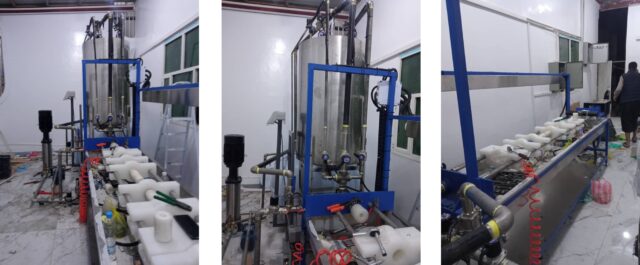
- The course of the strategic planning has urged the leaderships of the water utilities to discuss fuel support exit plans and reflect hands on measures of cost recovery improvement within the strategic plans of the water utilities.
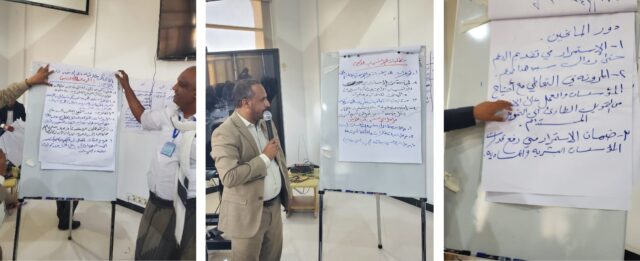
- The MetaMeta Approach on Green Roads has contributed to changing the mindset of the trainees to shift from draining water out of the roads to harvesting and using water effectively, creating livelihoods without disturbing water rights. The trainees requested to update the curriculums in the university with this concept and to standardise it in Yemen.
5. Some observations
The program succeeded in building a new type of capacity both in the North and the South of Yemen led by local institutions, i.e. the water and environment centres at Sana’a and Aden Universities. A good number of training courses were and can be repeated in the future on a regular base. Some additional courses for strategic issues can be added. Whereas the training centres at the two universities have increased their capacity, more can be done to consolidate and expand. It would be even more interesting if a small fund can be added to the training program to allow university students to help implement some applied research in some cases to make a better problem analysis and in others to help test possible solutions.
A very important issue is to further enhance the buy-in from the management of the organizations that are sending the trainees. The more management is aware from the way in which their organization can benefit, the more willing they will be to select the most suitable candidates for training. An option that may help to move in this direction is to establish a refresher training for managers.
Training can serve many purposes. Whereas the prime function is the development of skills and knowledge, it can also bring together people and create the motivation to make a difference. It may catalyse change in the services delivered by the organization represented by the trainees. Training can be a powerful instrument, not a support function, for improved organizational performance, particularly if it directly addresses the problems within the organization and brings the confidence and incentive that such problems can be handled effectively.
